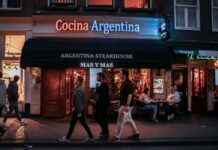In the city center, the «puestos de comida» («food stations») have lost their visual identity. Gone are the very graphic illustrations that decorated each kiosk: fruit for the seller of «super healing juices», a smiling little pig, red letters for the «delicious stew tacos».
Finished, this popular graphic design which announced since the 19th century the menu of the day to a population often illiterate at the time.
At each street corner now, simple counters made of laminated sheet metal, all the same, embellished with a tasteless message: «the town hall of Cuauhtémoc is your home».
Cuauhtémoc is one of the 16 divisions of Mexico City, the pearl of the crown with the cathedral, the historic center, and the hyper-trendy neighborhoods of Condesa, Roma and Juarez (parks, tree-lined streets, 19th century buildings).
– «You take it out or you shoot yourself» –
A few months ago, the town hall of Cuauhtémoc – named after the last Aztec emperor – asked for the erasure of the visual menus that decorated the kiosks and «street food» stations.
It’s a question of «order and discipline» to «improve the image» of the city, asserted the young mayor of Mexico City, Sandra Cuevas, who snatched Cuauhtémoc from the ruling left-wing Morena party in the elections. from June 2021.
Cuevas, 36, has since gained national notoriety in March by assaulting a police officer. Provisionally suspended from her duties, the young elected official had to apologize to the peacekeeper.
The affair of the «puestos de comida» may seem trivial compared to the multiple problems of a city of nine million inhabitants (traffic, pollution, rental prices, risk of earthquakes, crime a few kilometers from the relaxed lifestyle of Roma-Condesa).
But it is popular art and the traditional imagery of the city that is being murdered, says a group standing up against the initiative of Cuevas.
«It’s an attack on the identity of the city and on all the chilangos (inhabitants of Mexico City),» Aldo Solano, 35, art historian, told AFP.
For fear of reprisals, the tenants of the «puestos» do not dare to protest.
“They told us: you take it out or you go,” said one of the restaurant owners on the street on condition of anonymity.
Mayor Sandra Cuevas even before her election was accused by Mexico City officials of «extortion» against small informal businesses, which she denies.
Cuevas’ decision is «a very big mistake», sighs Adan Navarrete, 53, including more than 30 years in the service of street sign graphics. “Even if it seems simple, it is an art”.














